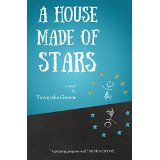Tawnysha Greene Discusses the Writing of A House Made of Stars
SHOPPING IN MY OWN CLOSET When I took one of my first creative writing classes at Auburn University, my professor, Judy Troy, suggested that we all “shop in our own closets” when writing stories. What she meant was that for a story to be real, we had to become vulnerable, and we had to place ourselves in our stories. While the characters, the settings, and the plot points were fictional, the emotions had to be real, and sometimes, we had to dig at the deepest, darkest parts of our lives to get there.  To prepare us for this kind of honesty, she had us each write an essay called “Who am I” and answer that question. We had to lay ourselves bare, and we did. We turned them in anonymously, and she read them each aloud in class. Some wrote about being homesick. Some wrote about battling eating disorders and depression. Some wrote about abuse. But we all wrote ourselves. And each time she finished reading one of these essays, she took off her glasses, set the paper down, and smiled at us. “See? You can write a story,” she said. “But you have to go deep.” That was where the stories always were. They were deep within ourselves.
To prepare us for this kind of honesty, she had us each write an essay called “Who am I” and answer that question. We had to lay ourselves bare, and we did. We turned them in anonymously, and she read them each aloud in class. Some wrote about being homesick. Some wrote about battling eating disorders and depression. Some wrote about abuse. But we all wrote ourselves. And each time she finished reading one of these essays, she took off her glasses, set the paper down, and smiled at us. “See? You can write a story,” she said. “But you have to go deep.” That was where the stories always were. They were deep within ourselves.
When it came time to start writing A House Made of Stars, I remembered this exercise. I knew I wanted to write the story of a young girl, but I had to shop in my own closet first. So I looked through old diaries and photo albums. I filled up pages of notes from the stories those pictures told. Stories about living in a tiny one room apartment over my aunt’s garage, homeschooling on a fold-up card table in the mornings, and cleaning other people’s houses to put food on the table–those narratives ended up in A House Made of Stars. Stories about living on food stamps and when those ran out, going door-to-door asking for money didn’t end up in the book. But even so, it was necessary to go back and relive these times so that I could tell the story of my narrator convincingly the way a young child would tell it. While I changed some of the details, my young narrator needed to come from a real place in my life so that the fear, anger, and joy she felt in the novel could feel real, too.
However, although my narrator’s struggles were concrete, her identity was not. In fact, I chose to make all the characters in the novel nameless. I wanted her identity to be fluid so that she could be anyone, and thus, anyone could be capable of eventually escaping the poverty and abuse of A House Made of Stars. I didn’t realize the full ramifications of this choice until after A House Made of Stars was published. After readings, women came up to me and talked about their own childhoods, their own fathers, and their own struggles in poverty. I visited a class that read A House Made of Stars as one of their textbooks, and so many of the students spoke about my narrator’s family as their own. They spoke about the mental illness in their own families, their own abuse, their own selves. I am her, this is my family, several said. The class ended up being a time of fellowship where it was okay to talk about these things and better yet, talk about what comes after–healing, hope, forgiveness, and triumph.
In that class, the students laid themselves bare as I had in Judy Troy’s class when I wrote my anonymous “Who am I?” essay. But we didn’t need to hide behind an anonymous essay. We could be proud of our stories, because during our childhoods, we saw times of darkness, but we were still here, and we were stronger for it. But first, we had to open that closet door and pull what was inside out. I left that class elated, exhausted, happy, emotional, and best of all–free. I have never been that vulnerable in front of a group of strangers before, but the experience taught me that my closet and their closets were very much the same. We weren’t strangers at all.
So, writers, don’t be afraid to open your closets and write your own stories. Even if these narratives become largely fiction, they will have started from a real place, and that truth is what readers remember after they’ve read the last page. I will never forget the stories we all shared in that classroom. While our names and the places where we grew up may have been different, our closets and the truths inside were all the same.
Tawnysha Greene
Tawnysha Greene received her PhD from the University of Tennessee where she served as the fiction editor for Grist: The Journal for Writers. Her work has appeared in PANK, Bellingham Review, and Weave Magazine. Her first novel, A House Made of Stars, was released from Burlesque Press in 2015.